#until I saw how well Ryu treats Susato
Explore tagged Tumblr posts
Text
You know I didn’t realize after AA5/6 just how badly I needed a judicial assistant who was like. Respected and valued by their attorney. Seeing how highly Ryu thinks of Susato is such a breath air after so many variations of the Manzai duo vibes
In case 4 when Van Zieks insults her and Ryu IMMEDIATELY snaps back with “I consider her advice essential and her assistance invaluable. Please go ahead, Susato” he instantly became my favorite. Put some respect on her name
#Maya and Phoenix’s dynamic imo is perfect#and Trucy is 15 so I also get that one#but watching Athena be berated and infantilized for 2 games is smth I didn’t even realize bothered me#until I saw how well Ryu treats Susato#and now I’m like hold on. drink ur juice (respect women juice)#ace attorney#tgaa#DGS#susato mikotoba#ryunosuke naruhodo#mod vex#hiding this post at like 1am after another post bc I don’t wanna start shit
527 notes
·
View notes
Text

Dear Anonymous,
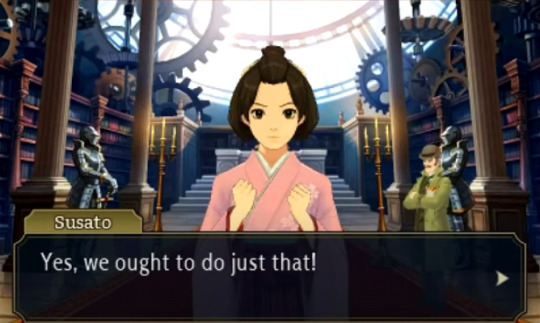
I still have yet to play (or watch) DGS2, unfortunately, so we’ll have to save that part for another time, but I’d love to delve into the shared adventures of this adorable duo in the first game.
When Ryuunosuke first meets Susato, she’s nothing more to him than an ally in his defense in court.

He doesn’t see her again until he and Kazuma find themselves at the end of their rope.

It makes you wonder if she’s the one who founded whatever School of Interrupting at Just the Right Time so many Ace Attorney characters apparently went to, doesn’t it?
When she appears, “calm and dignified, in our desperate final moments,” to use Ryuunosuke’s words, she causes quite the stir. Luckily, the five minutes granted to her by the judge to present some crucial evidence is all she needs to help him and Kazuma pull off the first turnabout in Ace Attorney’s history.
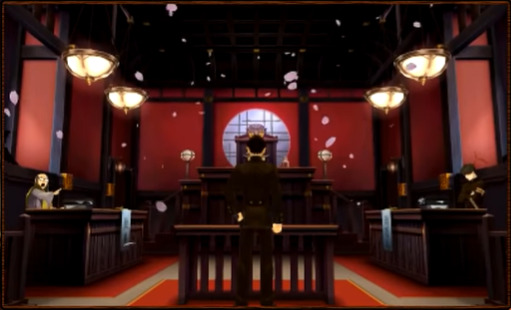
The mysterious legal assistant’s wish for Ryuunosuke’s good fortune was granted, apparently.
Thus Ryuunosu-- Um... Is it okay if I call him “Ryu” for short? Thus Ryu’s life was saved by a humble young woman who had the courage and decency to collect, summarize, and present the evidence that turned the case around in the nick of time. After leaving to finish his acquittal procedures with a humble bow, she disappeared, never to be seen by him again.
Or so he thought.
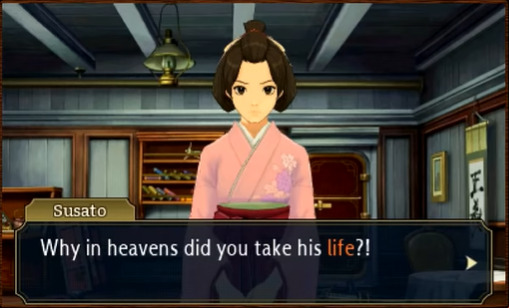
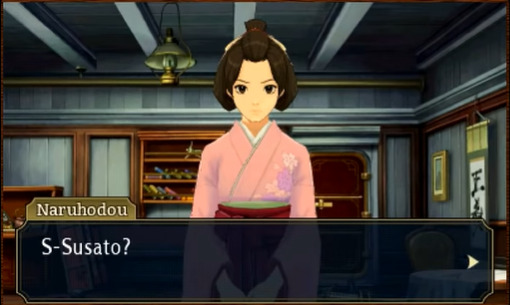
Similar to Phoenix and Maya’s first encounter, Ryu and Susato's second meeting occurs under the most tragic of circumstances. His close friend and classmate has been found dead in his cabin on the ship he managed to smuggle himself onto. Unlike Phoenix and Maya’s situation, however, it’s the lawyer (or soon-to-be lawyer) who is initially blamed for his death. To make matters worse, the young woman who helped to save his life isn’t feeling quite so compassionate this time around.
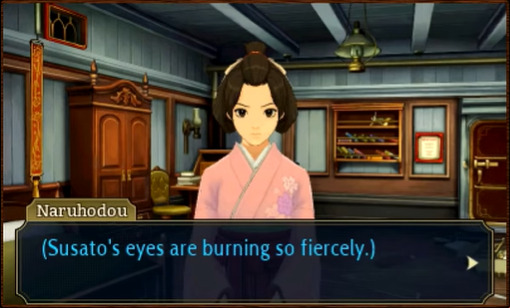
Her anger and distrust are understandable, considering that the evidence seems to point to Ryu as the culprit, on top of the fact that Kazuma was her foster brother. Luckily, she’s polite and reasonable enough to hear Ryu’s side of things, and even claims that she wants to believe him, so the two of them are at least able to treat each other civilly.
That is...until he tries to start investigating.

There’s a bucket load of energy beneath that demure countenance of hers, it turns out. Her move even has a special name -- the “Susato Toss.” Who would’ve thought she came straight out of Street Fighter?
Thankfully, she still has a reasonable side.

By presenting evidence of his innocence, Ryu not only vindicates himself, but finally starts to gain Susato’s trust.

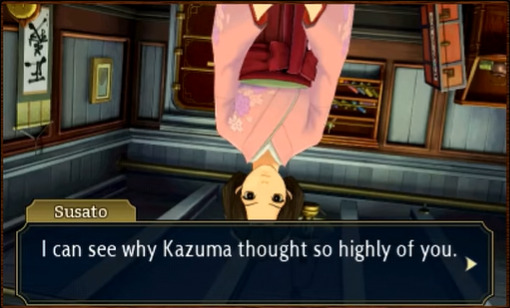
Sadly, her trust only lasts until a certain world-famous detective shows up to accuse Ryu of being a Russian revolutionary.

It’s hard to blame her, of course. Who wouldn’t trust THE Sherlock Holmes’s logic?
Nonetheless, her determination to find out more about Kazuma’s death is strong enough for her to begrudgingly continue the investigation with Ryu. One notable moment occurs here when he attempts to gain favor wither her by appealing to her love of mystery novels.

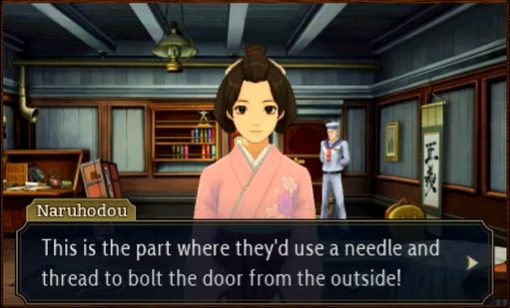
She’s no fool, of course, and only dislikes him even more for expecting her to fall for it.
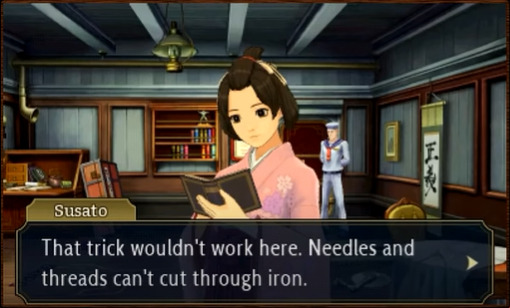
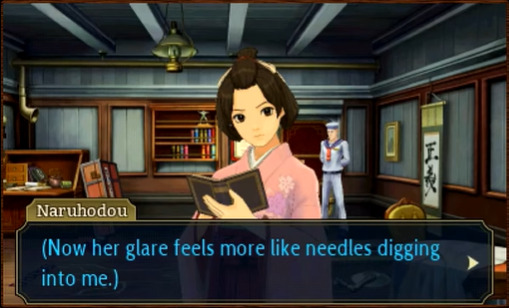
If I didn’t know any better, I’d say this was the “main characters don’t get along until they’re forced into a situation together” cliché. This situation may not fit that cliché perfectly, but it’s not too far off if you ask me.
When Ryu is finally allowed to investigate outside the cabin, Susato begins to show a bit more sympathy for him.
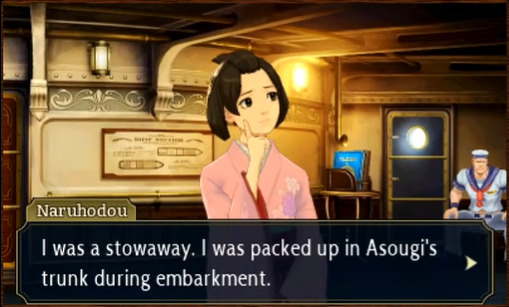

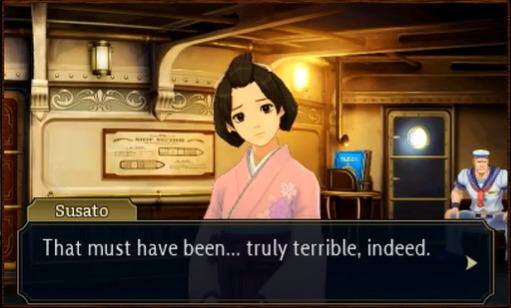
I have to give her some credit for that -- it takes a special kind of person to show compassion for a possible murderer. It also seems like she’s beginning to see Ryu as more of a human being than a heartless criminal. Baby steps, as they say.
From that point on, their dialogue begins taking on a more friendly tone. Thus Susato, whether on purpose or by fate, takes on the role of the first official assistant in Ace Attorney’s history. And boy, does she pull it off like a pro.
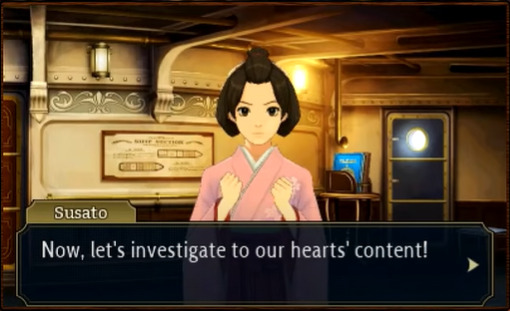
To make a long story short, their cooperative efforts combined with the ridiculous logic of a kooky detective (as well as the assistance of the less kooky Detective Hosonaga) bring them to the truth of Asougi’s death in the end. While this clears Ryu of the crime and offers some much-needed closure for both him and Susato, his death still affects them deeply.
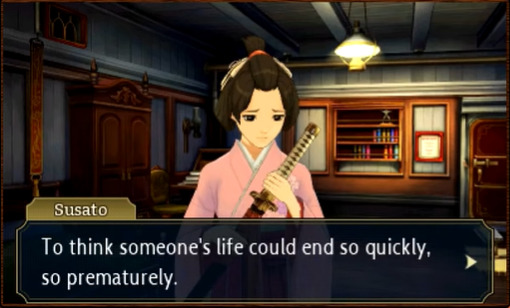
Something wonderful stems from this tragedy, though -- a crucial moment, not only for the two of them, but also for the Japanese and British Empires.

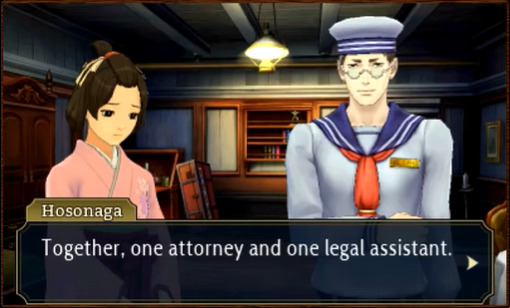
With Asougi’s passing, the exchange program between Great Britain and Japan is forced into suspension, unless, somehow, a replacement attorney can be found before the ship reaches London.

It’s a shame it has to end this way after all they’ve been through together, but that’s just the way it goes someti--

...Oh. Well, then. Who would’ve seen that coming? (Besides us, I mean.)
And strangely enough, the young woman who once saw Ryu as a cold-blooded murderer has this to say about him becoming an attorney:
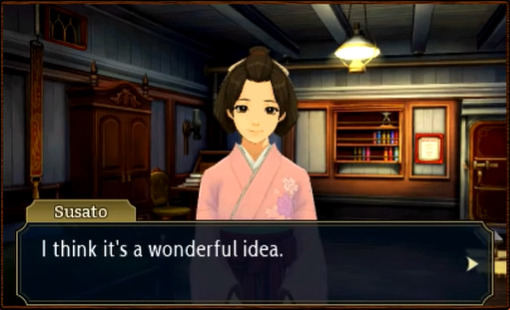
Thus a new attorney/assistant pair arises from the ashes of one attorney’s passing (pun fully intended), and the two of them step into a new journey in their lives together. And thankfully, it wasn’t exactly the cliché it appeared to be -- the two of them are now trusted friends, and Susato even offers to let Ryu toss her three times as punishment for not believing him. (It doesn’t quite end that way, but that’s beside the point.)
The first leg of said journey takes place in the “centre of the world” the incredible city of London. What a place to begin, am I right?

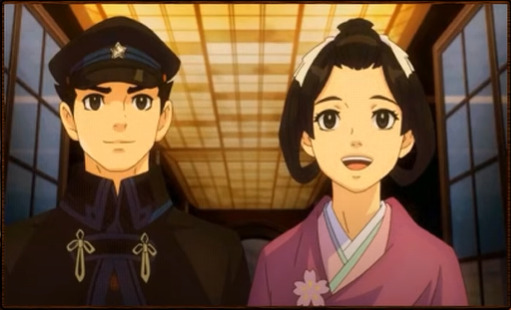
Thus their incredible legal adventure begins (or adventures begin, I should say) in beautiful Victorian Era Britain. To describe their encounters here briefly (and so I don’t spend a whole year on this essay), they learn together how the British court system works...

...about its imperfections...
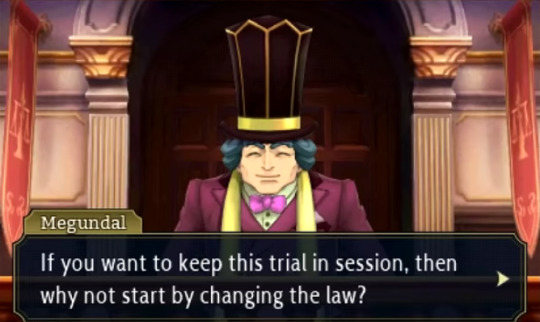
...how it feels to pull off a turnabout in a British courtroom...
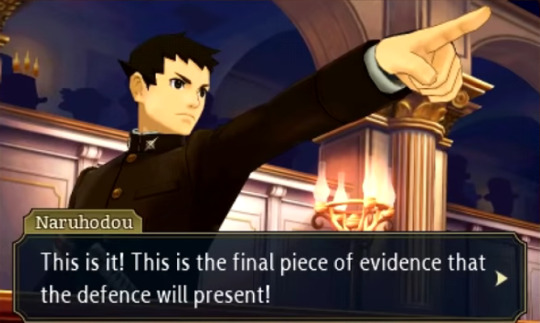
...and perhaps most importantly, about the value of trust.
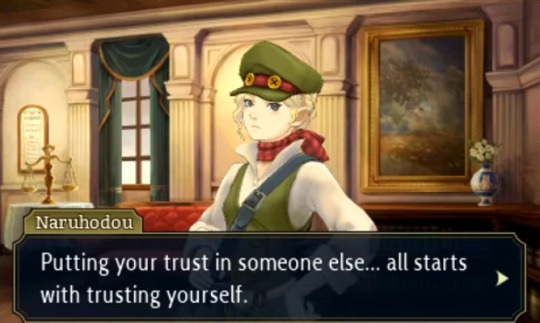
To say nothing of their misadventures with Mr. Holmes, his young genius assistant, and several other unforgettable British folk.
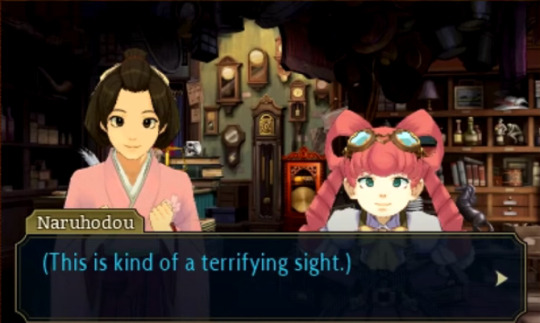
And a fellow Japanese immigrant, too, of course. Who could forget him?

You know, I’m starting to wonder if he might be one of Larry’s ancestors.
The game throws one final curveball for the great legal duo before it ends. After telling Susato she’s the world’s best legal assistant, Ryu gets a very unexpected response from her:
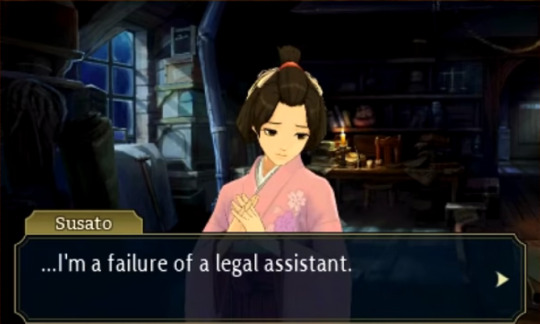
When he attempts to confront her about it, all he gets is another Susato Toss.
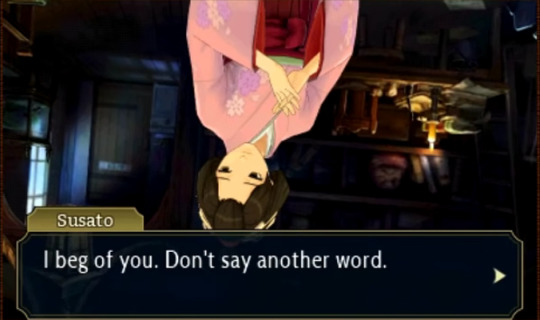
What could someone like her, who’s already proven her worth as a legal assistant several times, be hiding? Unfortunately for Ryu, he’s unlikely to find out soon, since her father’s illness has called her back home, leaving him to pull off his next turnabout on his own. She doesn’t go without leaving behind as much helpful evidence as she can muster, of course.
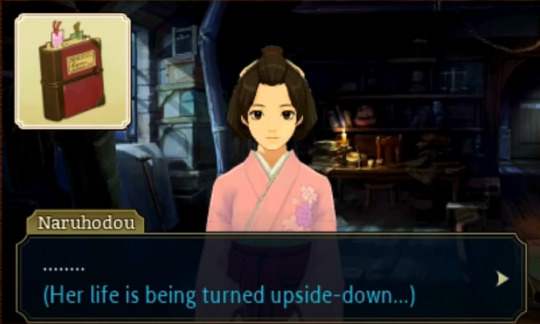
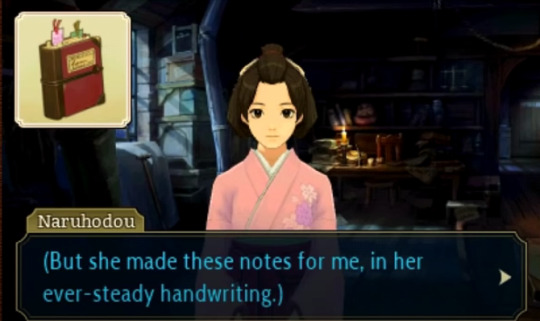
But, as fate would have it, a storm prevents her ship from departing for at least half a day, giving Ryu and his new flatmates a chance to see her off. On top of that, it gives Ryu the chance to find out precisely what inspired Susato’s words of doubt.
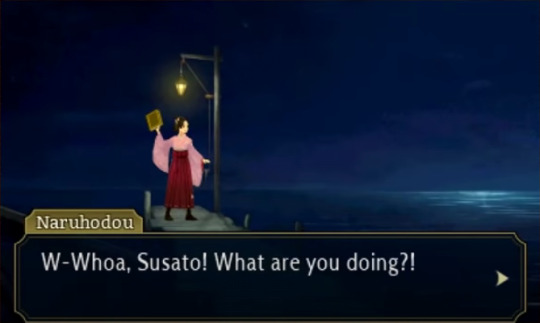
He catches her preparing to throw a copy of the British Empire’s Code of Law into the sea. What would cause her to do such a thing?
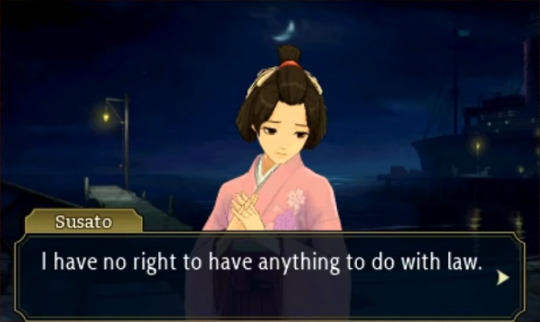
It turns out she broke one of the rules by tampering with the scene of the crime, and another by concealing that fact. Her intentions may have been good, but her conscience became a little too heavy for her to let it go. She takes it a step further by claiming that, for one moment, she began to doubt the law.

She may not be wrong in stating this (she learned it firsthand in the British courts, after all), but it still caused her to see herself as a failure of a legal assistant. Luckily for her, though, Ryu had learned some things himself in the time they spent together.
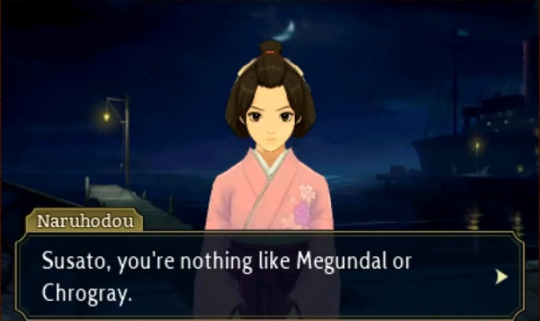
While her methods were questionable at best, Ryu recognizes something in Susato that sets her and every just person apart from a criminal: a desire to protect the innocent. Whereas Chrogray used her tampering as a way to protect himself, her only desire was to protect Gina’s life and to ensure that Ryu would be able to prove her innocence in the end. In other words, her faith in the system may have been lacking, but her desire for justice, like Ryu’s, never faltered for even a moment. With that knowledge in mind, the two of them can part with a better knowledge of the law, a better understanding of each other, and smiles on their faces.

So, to sum it up, Ryu and Susato go from being friendly acquaintances, to a murder suspect and suspecter (for lack of a better word), to investigative partners, to full-fledged legal partners, and finally, to a legendary legal duo. Will their relationship ever go any further than that?
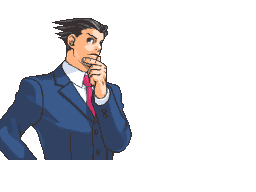
Also, full disclosure -- it’s been a long time since I watched Dai Gyakuten Saiban, so I had to do a hefty amount of re-watching in order to remember some of these details...hence why this essay took so long. Thanks for waiting!
And hey, how’s that for good timing?

Don’t know about you, but I’m eagerly looking forward to revisiting this unforgettable saga. And, y’know...doing it the proper way instead of depending on fan translations.
-The Co-Mod
19 notes
·
View notes